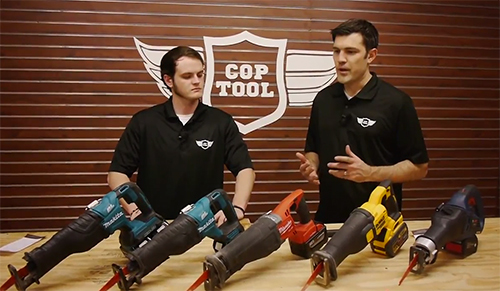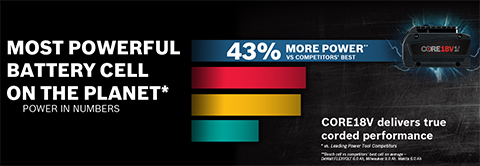2017 Brushless Recip Saw Shootout – Bosch, Dewalt, Makita, Milwaukee
A couple years ago we did the 2015 Recip Saw Shootout which was sort of a no contest because at the time Milwaukee was the only tool company that had a brushless recip saw. Naturally the only brushless saw won going against 4 brushed saws and we got accused of being on the Milwaukee Tool payroll. A few years later now that most of the other brands have brushless options its well proven brushless options outperform their brushed counterparts, Milwaukee was just well ahead of the curve in 2015. It’s now 2017 however so we’ve got new batteries and 5 new saws!
Comparing Cut Speed
Ideally we could compare power of these 5 saws with an AMP or Watt Output number however the tools brands don’t really share those numbers and with cordless it’s not as easy as simply plugging into a meter as you can with AC tools. What we can compare is cut speed in common applications, ¾” black pipe and 2×4” pine. Certainly factors such as no-load RPM & stroke can play a role here but tweaking those numbers are part of the goal of trying to improve speed, how fast can they get the job done.
Soft-Start does come into play here as it deliberately goes against flat out cut speed with the intent of providing better cut control, prolong tool life and prolonged blade life. When dialing in the Milwaukee Sawzall ONE-KEY settings this was very apparent with an exaggerated ramp up time that we liked but clearly made the total cut speed longer. This is where power and speed are clearly 2 different metrics.
Bosch 18V Brushless Reciprocating Saw – GSA18V-125
Cuts in Metal: 7.27, 6.08, 4.86, 5.74, 4.96 – Average 5.78 seconds
Cuts in Wood: (in Orbital) 3.37, 3.46, 4.46, 4.66, 3.88 – Average 3.84 seconds
Milwaukee M18 ONE-KEY Sawzall – 2721-22HD
Cuts in Metal: 3.01, 2.25, 2.4, 2.46, 2.78 – Average 4.2 seconds
Cuts in Wood: 3.71, 4.33, 3.38, 2.95, 3.21 – Average 3.51 seconds
Dewalt FlexVolt Reciprocating Saw – DCS388T2
Cuts in Metal: 3.03, 3.18, 3.56, 3.71, 4.6 – Average 3.61 seconds
Cuts in Wood: 3.19, 3.5, 3.46, 3.14, 3.39 – Avarage 3.34 seconds
Makita 18V Brushless Reciprocating Saw – XRJ05
Cuts in Metal: 1.91, 3.16, 3.01, 3.6, 3.45 – Average 3.03 seconds
Cuts in Wood: 3.05, 4.0, 3.31, 3.3, 3.6 – Average 3.45 seconds
Makita 18Vx2 Brushless Reciprocating Saw – XRJ06
Cuts in Metal: 2.35, 2.25, 2.4, 2.46, 2.78 – Average 2.45 seconds
Cuts in Wood: 2.73, 2.92, 2.81, 3.3, 2.85 – Average 2.92 seconds
For speed controls all offer variable speed trigger, Makita(s) are both 2 speed, Bosch has a speed dial & 3 orbital options, Milwaukee ONE-KEY allows you to set speed specific to the application and finally the Dewalt offers no speed controls other than the trigger.
Comparing Ergonomics
In the video above you can see the blade change mechanism which using Diablo Carbide Blades add significant amount of time to blade life (10x or more) so this becomes less of a hassle. Weight also plays a role in any of these saws but again the margin was pretty narrow from the single battery Makita 18V at 8.3 lbs to the Dewalt FlexVolt with 9.0Ah battery at 10.65 lbs. All have a pretty traditional design except the new Bosch saw with angles the motor and provides a large grip for the handle. This new design integrates vibration control as well as provides better grip as various hand positions. At first it felt goofy but after just a little use it grows on you.
Battery Life
In the 2015 comparison test we focused much more on battery life because we were able to get 4 of the 5 saws with 5.0Ah and the only outlier was the Metabo LiHD at 5.5Ah, still pretty close. With these 5 saws in 2017 however it just doesn’t make sense to focus heavily on runtime because you can’t get an Apples to Apples across the board. Dewalt 9.0Ah FlexVolt and Bosch 18V CORE ($149) use the 20700 cells while the Milwaukee & Makita continue with the 18650 cells. The new Bosch 6.3Ah battery compares themselves to the 9.0Ah in their marketing (see our post CORE 6.3Ah) and aim to go head to head and compete on size, weight, charge time, power per Ah & peak power output. We went with the 4.0Ah with Makita so the XRJ06 would have a total of 8.0Ah to try and line up with the others.
We fully broke down 10 pallets with each recip saw (more on the pallet projects to follow) then wore out the batteries on 2×4, for those that lasted. In our test the Dewalt 9.0Ah did out last the Milwaukee 9.0Ah, a sharp contract to the Cordless Miter Saw head to head with the FlexVolt using 2x 6.0Ah batteries. The Bosch seemed to have strong battery life per Ah but certainly not near the total life of the 9.0Ah counterparts. At this point we would be surprised to not see new 20700 battery packs from Milwaukee & Makita anyway which is another reason we focused more on power and cut speed than run time.
Our Conclusions & Insights
Recip saws are hard to compare in general and most people are brand loyal to their battery platforms but we did have some specific questions going in to this comparison we wanted to answer.
- Is the new Bosch 18V Brushless Recip GSA18V-125 ($299, bare) a competitor? Our model seemed to perform a little behind the other saws, we have seen some similar comparisons online where the Bosch was faster but that was not what we had. We do really like this new Bosch and thought the performance was very respectable for the saw and really like the new 18V CORE battery. Our only objection was not in performance but the price tag, for a bare tool which seemed high.
- How did the Makita XRJ05 compare to XRJ06 in performance? We answered this question with it’s own post last week Makita Recip Saws XRJ05 vs XRJ06 check that out for much more info on these two! We would stick with the XRJ05 but the XRJ06 does have slightly more power.
- Does the Milwaukee M18 FUEL ONE-KEY Sawzall 2721-22 ($449) outperform the M18 FUEL Sawzall 2720-22 ($399) enough to justify an extra $50? For our money the 2720 Sawzall performs very well, we didn’t see a jump in performance or runtime that might justify the higher price. Possibly overtime there would be a savings in blade life, maybe. We love the tool tracking feature but that’s a steep upcharge, we wish they just built in TICK tracking to all FUEL tools at same price.
- Does the Dewalt FlexVolt outperform competition enough to justify a new battery platform? We think the DCS388T2 ($379, kit 6.0Ah) did perform very well, lots of power, actually skewed a little because of a slight soft start. Having seen others build comparable saws on their 18V platform it would feel like a bit of a slight for a loyal 20V Dewalt user to now need to upgrade to get a brushless recip saw. Also there are not currently kits with the 9.0Ah but we would recommend going 9.0Ah (with 20700 cells) if you are going to jump to FlexVolt, the 6.0Ah FlexVolt are 18650 cells.



magnificent post, very informative. I wonder why the opposite experts of this sector do not realize this. You should proceed your writing. I’m sure, you’ve a huge readers’ base already!
I’ve been absent for a while, but now I remember why I used to love this web site. Thank you, I will try and check back more frequently. How frequently you update your web site?
I¦ve recently started a web site, the information you provide on this website has helped me greatly. Thank you for all of your time & work.
You actually make it appear so easy with your presentation however I in finding this topic to be actually one thing which I feel I might never understand. It sort of feels too complex and extremely broad for me. I am having a look forward on your next publish, I will attempt to get the hold of it!
I don’t even know how I ended up here, but I thought this post was good. I do not know who you are but certainly you are going to a famous blogger if you are not already 😉 Cheers!
Thanks , I’ve recently been searching for information about this topic for ages and yours is the greatest I’ve discovered till now. But, what about the conclusion? Are you sure about the source?